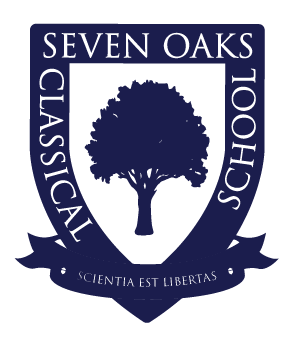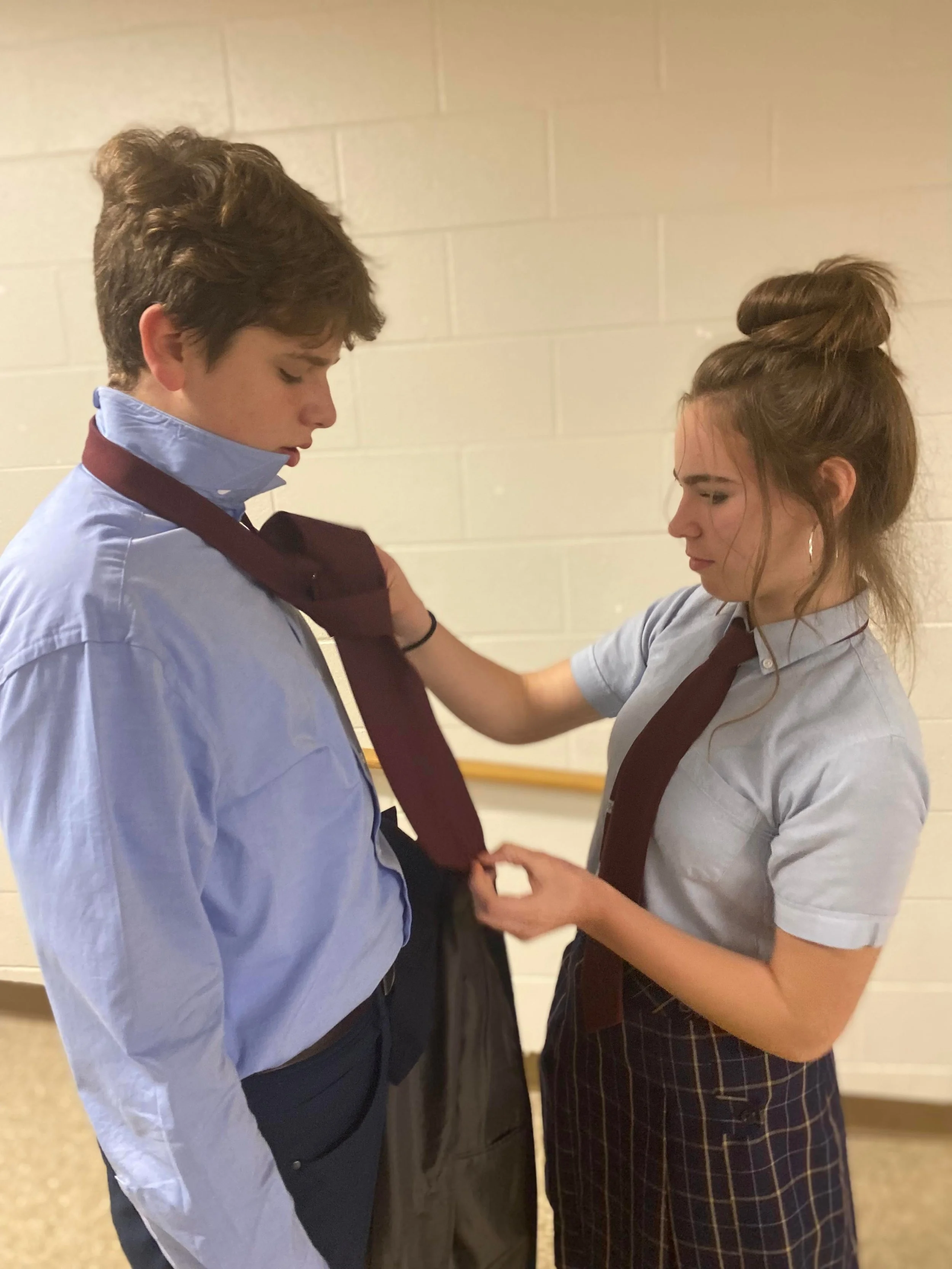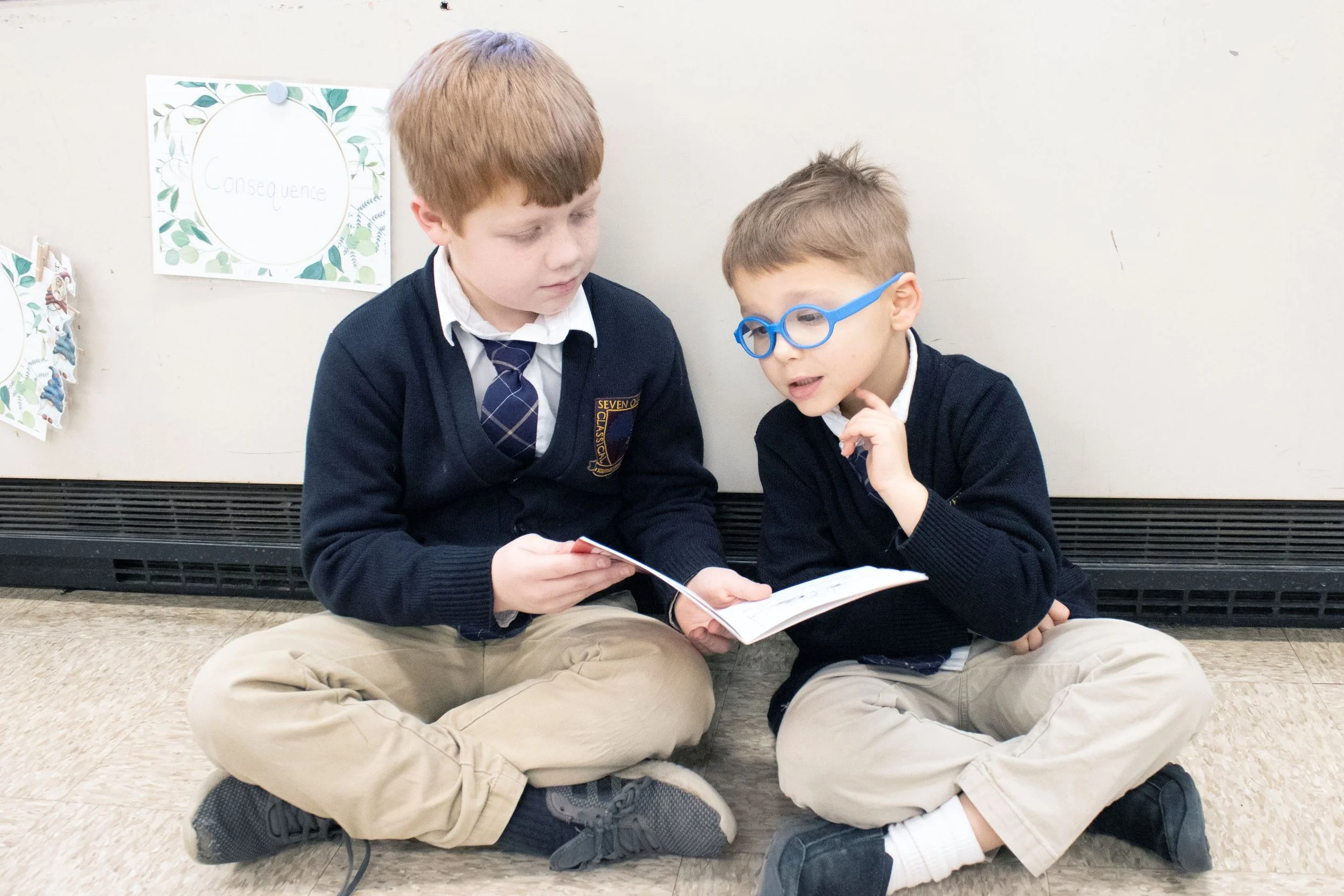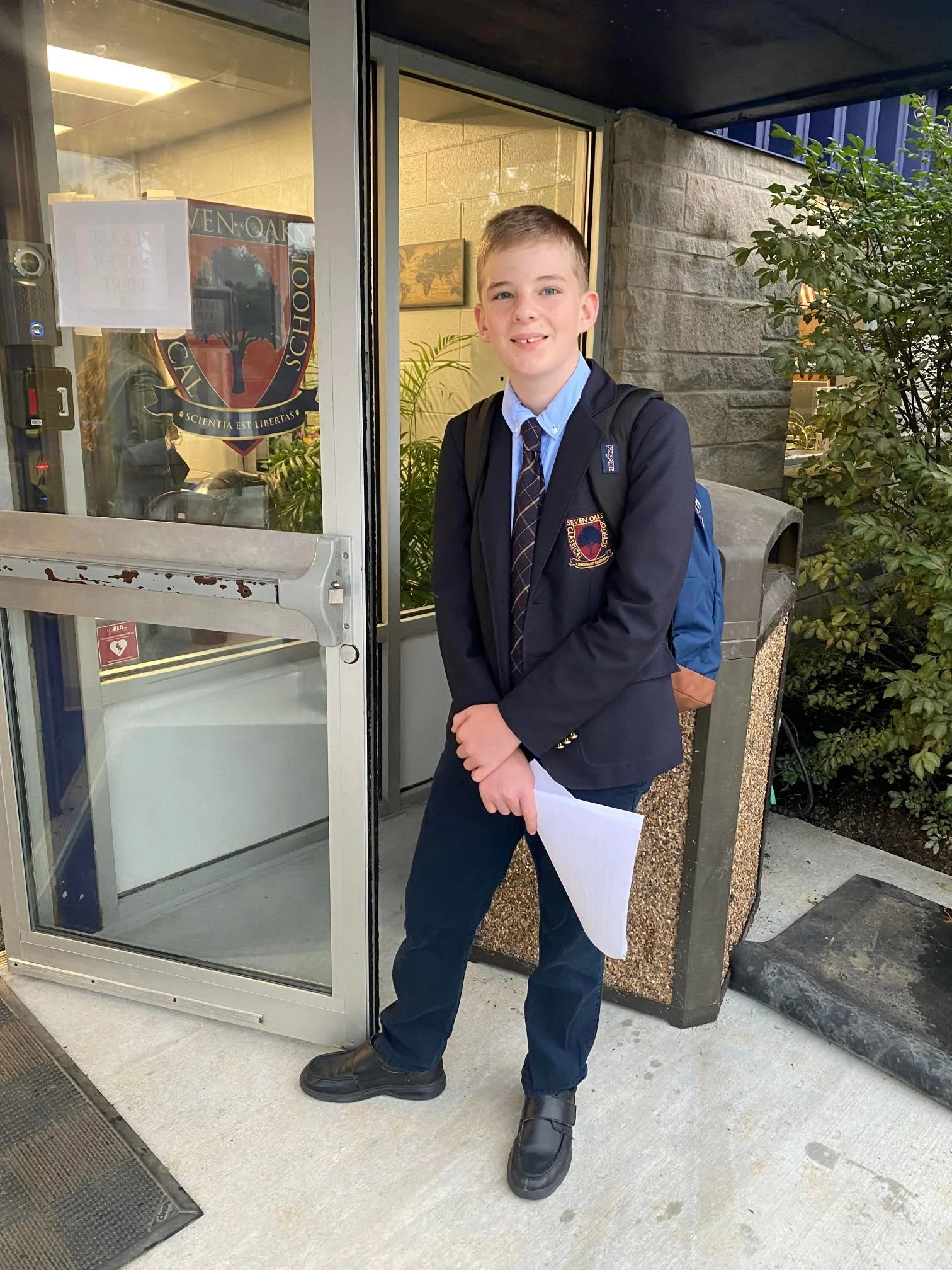FAQs
How much homework should a student expect?
Nightly homework is a regular part of our academic program. As a general rule of thumb, students should expect ten minutes of homework per grade level, plus some additional reading. Thus, the typical first-grader should anticipate 10 minutes of homework each evening on average, besides the time his/her parent spends reading to the child, whereas the typical sixth-grader should expect roughly an hour of homework each evening (minus whatever the student completes in the half-hour study hall that upper school students have at the end of each school day).
What is your position on the use of technology in the classroom?
We believe that technology should be regarded as a tool. Where it is helpful, we favor its use. Where it is a hindrance, we avoid it. Typically, students do not use electronic devices in the classroom. We certainly do not aspire to a 1:1 student/technology ratio. Use of cell phones is not permitted during the school day. That said, various electronic tools, including student laptops, are available for use at the discretion of the teacher. There is a computer lab and carts of Chromebooks available for teachers to check out. Each classroom is equipped with a computer, projector, and document camera.
Why the emphasis on Latin?
The Latin language outlived the Roman Empire. It remained the common language of the educated class throughout the West until the 1700s. Those who master the Latin language will enjoy immediate access to two millennia of some of the greatest philosophical, theological, political, literary, scientific, mathematical, medical, artistic, musical, architectural, and educational works ever written. Translation of Latin literature also cultivates a keen sense of style, one that is characterized by precision, order, and beauty. Even for those who do not achieve mastery, the benefits are significant. Study of the Latin language provides an excellent foundation for the study of English vocabulary and grammar. Roughly two-thirds of the English language derives from Latin. Other benefits owe to the structure of the Latin language. Translating Latin demands careful and logical thought. The memory, discipline, and focus required by the study of Latin provide the sort of mental conditioning that makes students more capable in every other course of study they undertake. It is no accident that students who study Latin consistently score higher on the SAT and outperform their peers in other fields of study.
Why the focus on the Western tradition?
We seek to prepare students for the responsibilities of citizenship in a free society. To that end, we seek to impart cultural literacy—to introduce students to the accumulated wisdom and experience of our intellectual and social traditions. Our culture’s roots are predominately Western. And so, while we study non-Western cultures as well, particular emphasis is put on the West. And within the West, we give particular attention on our own country. We strive for a balance of depth and breadth. Beginning in Kindergarten, students at Seven Oaks Classical School begin studying world history and geography. They also begin learning American history, literature, sayings, and poems. By the time students reach middle school, they will have studied virtually every major civilization, ancient and modern, Western and non-Western. Meanwhile, they will have engaged in a rich and recurring examination of American history, literature, philosophy, and politics.
What is Literacy Essentials?
Literacy Essentials, by Access Literacy, is a form of explicit phonics instruction in the Orton-Gillingham family of curricula. This approach lays the foundations for high levels of literacy through explicit, intensive phonics instruction. Students learn all 71 phonograms in the English language and the rules for their use, as well as penmanship and grammar. For more information, see www.accessliteracy.com/.
What is Core Knowledge?
The Core Knowledge Sequence is the backbone of Seven Oaks’ K-8 curriculum in history, science, literature, music, and art. The Core Knowledge Sequence is premised on a few basic ideas. The first is that knowledge builds upon knowledge. In each subject, a student’s reading comprehension and overall academic success depends on whether he or she possesses sufficient background knowledge to make sense of new material. The second idea is that there is a common body of knowledge all citizens should possess. A shared body of knowledge makes possible high levels of literacy and communication. Mastering this common body of knowledge broadens students’ minds and lays the foundation for effective communication and intelligent participation in the civic life of our country. Consistent with both of these ideas, the Core Knowledge Sequence seeks to teach students the “grammar” of each subject. The Sequence consists of an integrated, content rich course of study that systematically builds students’ background knowledge in the various academic disciplines.
Why Singapore Math?
Singapore Math was developed in the nation of Singapore, which consistently ranks at the top of the world in mathematics. Singapore Math teaches the subject in the way that older generations of Americans learned it. This approach is marked by a teacher-guided discussion of each component part of a math concept in order to avoid over-reliance on formulas. It builds a conceptual understanding by moving from the concrete to the pictorial to the abstract. It places particular emphasis on mental math and mathematical reasoning skills. For more information, visit www.singaporemath.com.
General Questions
What is a charter school?
Charter schools are tuition-free, open-enrollment public schools that enjoy greater freedom in exchange for greater accountability. Their independence allows for innovation, thus offering parents meaningful choices in the education of their children. Seven Oaks Classical School offers a traditional education in the liberal arts and sciences, with an emphasis on moral character and civic virtue. In Indiana, each charter school is operated by an independent school board under the terms of the school’s charter, as approved by an authorizer. In the case of Seven Oaks Classical School, the authorizer is Grace College.
What is classical education?
A classical education is an education aimed at human excellence. It is traditional in the ends it pursues, in the materials it uses, and in the methods it employs. Classical schools seek to cultivate virtuous habits of thought and action in order to orient students’ minds and affections to the true, the beautiful, and the good. To this end, classical schools offer a traditional course of study that focuses on the liberal arts and sciences, and a traditional pedagogy that emphasizes active, integrated learning. For more about classical education, see What is Classical Education?
Is Seven Oaks Classical School accredited?
Yes. Seven Oaks Classical School is a public charter school and thus is accredited through the state of Indiana.
What is Seven Oaks’s rating on the state’s accountability system?
Although Seven Oaks is not a test-prep school and prefers to focus on its curriculum, the school has consistently maintained an ‘A’ rating on the state accountability system. Click here for access to the state report card and here for the most recent federal report card.
Is Seven Oaks Classical School a private religious school?
No. Seven Oaks Classical School is a public school. As such, it has neither a religious identity nor a religious mission. World religions do come up in the study of history and literature, but our aim is to inform, not to proselytize.
Does the school offer transportation?
No. Unlike conventional public schools, charter schools do not receive money through local property taxes for capital improvements or transportation. Parents are encouraged to form carpools to help ensure an efficient carline. Other possibilities include travel by foot or bicycle.
Does Seven Oaks have a uniform?
Yes. In order to level the playing field socially, foster an atmosphere of respect, minimize distraction, and elevate the tone, students are required to wear uniforms. Studies have reaffirmed what we already knew to be true—that uniforms are conducive to learning. The school will make every effort to provide assistance to families in need. Seven Oaks believes in the value of uniforms but committed to not allowing uniforms to become a barrier to entry. Our education is for everyone who wants it, regardless of income.
What qualifications do you require of your teachers?
As required by state law, at least 90% of our full-time teachers are state-certified or in the process of obtaining a valid form of certification or licensure. At Seven Oaks Classical School, we seek teachers who love learning, who are expert in the subjects they teach, and who can ably communicate what they know. We seek teachers who love working with young people, who seek to instill good habits in the students, and who accept the responsibility of modeling what they wish their students to become. In the upper grades, especially, we seek content area experts. A number of our teachers hold advanced degrees in the field in which they teach.
About the curriculum
About enrollment
How long is the school day?
Drop-off is from 7:20-7:45am. School begins for all grades with a morning assembly or homerooms at 7:45am. Dismissal times vary by grade, ranging from 3:00pm for the youngest students to 3:30pm for the older ones. Parents are required to pick up by 3:45pm or else make arrangements for after-school care, which is available through the onsite, school-run Homework Club or through the local Boys & Girls Club.
Although the school day is a bit longer than some area schools, we break up the day for the younger grades with multiple outdoor recesses. The day also allows us to offer regular instruction in art, music, and PE all the way through eighth grade.
How old does a child need to be to attend Kindergarten?
Students must be at least 5 years old on or before August 1 to enroll in kindergarten. Students who turn 5 years of age after August 1 but before January 1 may appeal for early kindergarten admission. For more information about the appeal process, please email admissions@sevenoaksclassical.org or call the school office at (812) 935-5003.
Do you have a preschool program?
No. We do not currently offer preschool.
Does Seven Oaks admit students who are receiving special education services?
Yes. Our Student Services department provides assistance to those with an Individualized Education Plan (IEP), English Language Learners, and students who are significantly behind grade level. Seven Oaks practices an inclusion model. Classroom teachers and student services staff collaborate to ensure that students remain in the general classroom as much as possible with minimal alterations to the curriculum.
Does Seven Oaks admit students who are English Language Learners?
Yes. Seven Oaks will provide English as a Second Language (ESL) support. However, we do not offer bilingual instruction.
What if there are more applicants than seats?
As a general rule, all students who register in a timely manner will be given an equal opportunity for admission. After the initial registration period each year, enrollees will be processed in the order in which they are received. There are two exceptions: As permitted by state law, siblings and the children of faculty and staff will receive priority admissions status for any open seats. Where there are more registrants than seats, the order of admissions will be decided by public lottery. Once enrolled, students at Seven Oaks will be guaranteed a seat in each subsequent year, so long as their parents inform the school of their intent to return the following year. For additional information about the enrollment process, see the admissions page of the web site.
Is it possible to enroll after the school year begins?
Yes. If a seat becomes available, the school will contact the family at the top of the wait list to discuss their interest in filling the opening.
How can I learn more about the school?
This website is a good place to start. On the calendar page, you will find information about public meetings, where you can meet the headmaster and learn more about the school. You may also call the school at (812) 935-5003.










